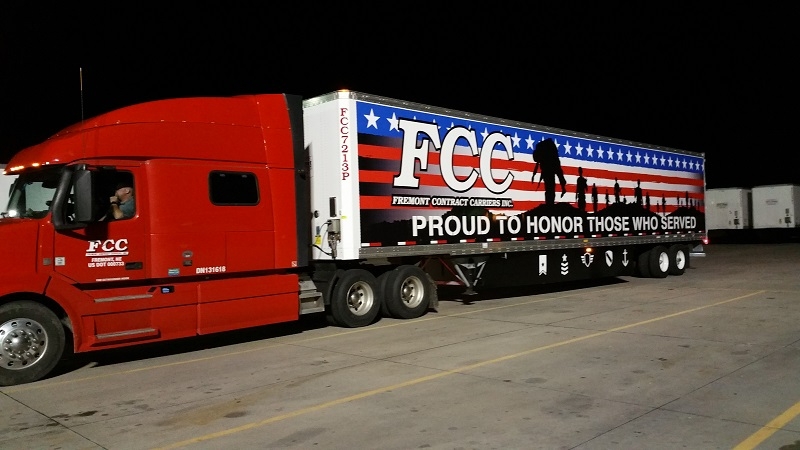October 11, 2017
Every year for nearly a decade, truck drivers and owner-operators from across the U.S. and Canada call attention to the top fleets in the industry. Through nominations and evaluations, CarriersEdge and Truckload Carriers Association (TCA) identify and honor the carriers providing the best workplaces for their drivers.
Omnitracs is proud to work with the best fleets in the business. This is the second in a series of posts in which we’re shining a spotlight on several Omnitracs customers that were recognized as one of the Top 20 Best Fleets to Drive For and exploring what makes them great.
Founded in Fremont, NE, in late 1965 by Wendell Bruner, Fremont Contract Carriers (FCC) has been owned for the past 23 years by Mike Herre. Since Herre’s acquisition, the company has grown from a Midwest regional operation with 50 tractors to a 400-plus tractor, 1,000 trailer dry van and flatbed outfit that serves all 48 contiguous states and Canada.
Fremont consistently ranks as one of the top trucking companies to work for in America, and it does it with a notable mix of employee drivers operating company-owned rigs and contract drivers. About 40 percent of FCC’s drivers are owner-operators.
This year, for the seventh straight year and for the eighth time in the last nine years, FCC was named to the CarriersEdge/Truckload Carriers Association list of Top 20 Best Fleets to Drive For. In three of those years — 2009, 2011 and 2015 — it was ranked No. 1 on that annual list.
Such consistency in the rankings doesn’t happen by accident, nor is FCC merely coasting these days on reputation.
“It starts at the top,” says Tim McCormick, FCC’s President and CEO. He’s not referring to himself. Herre, who has been in the trucking industry for more than 40 years, still takes time to sit down with every new hire to have a personal, one-on-one “get to know you” conversation.
“I always thought that was pretty impressive,” McCormick says. “Herre takes the time to find out where they live, where they are coming from and what are they looking to do. He sets the bar for the rest of us to try to emulate that same thing.”
One quickly noticeable result of that approach is that despite the company’s size, managers and most office employees at the FCC headquarters and regional offices casually greet visiting drivers by their first names. They inquire about the drivers’ children and spouses, and show genuine interest in what’s going on in the drivers’ lives outside the cab.
Another is the remarkably low churn rate at FCC. While industry turnover rates average around 75 percent a year, FCC’s average is roughly 22 percent, which includes a recent spate of driver retirements. Credit goes to FCC’s high standards for new hires and annual driver performance, emphasis on providing drivers with high quality equipment, and training.
That includes keeping the company-owned tractor fleet at an average age of just 18 months old or less, equipping them with top notch technology for managing traffic, load tracking and vehicle performance, and equipping them with auxiliary power units so drivers can power all their gadgets (including microwave ovens) without having to idle their trucks. Now that fuel prices are less than half what they were a few years back, APUs don’t necessarily save the company a lot of money, but they do help attract and retain top quality drivers.
FCC is extremely committed to using technology to make drivers’ lives better and the company’s operations more efficient. Technology Research Manager, Dan Michalski, tests everything from in-cab communications and monitoring devices to new mud flaps and aerodynamic devices before they’re added to the fleet.
“It was the kind of position that was created to eliminate the snake oils,” Michalski says. “There are so many new technologies and products in the transportation industry, FCC saw the need to create its own testing department to separate the wheat from the chaff.”

Beyond making the in-cab experience second-to-none, FCC also ensures its drivers have adequate time off and personal time. According to McCormick, “‘Home time’ is an extremely important part of our company culture. Our drivers have a lot of things going on in their lives, so we really try to schedule drivers on ‘out-and-back’ assignments rather than keeping drivers away for weeks at a time.” The goal is to deliver schedules that will give drivers 48 straight hours at home each week.
In fact, that causes FCC to be more cautious about what loads and assignments it will and won’t accept. “There are a lot of companies out there that run random. They’ll book anything just to keep the wheels moving on the trucks,” McCormick says. “We’re very strategic about what we’ll take. We’re not a carrier for all customers. We make sure we’re a good fit — that their freight fits us and we’re a good fit for them.”
FCC also pays attention to driver “fit” when hiring. Drivers must have a minimum of three years’ experience, and an excellent driving record, before Fremont will consider hiring them. They also must exhibit the maturity necessary to represent FCC well at customers’ loading docks and warehouses. These standards not only apply to employee drivers, but also to owner-operators who want to become contract drivers for FCC.
“If you keep your hiring standards high, and hire good individuals who want to be here it ultimately increases overall company performance,” McCormick says. “We constantly hear from customers, ‘We can always tell if it’s an FCC driver that’s coming in to pick up paperwork because they act different. They’re more professional.’ That’s a great feeling.”
FCC’s focus on attracting, training and retaining top notch drivers also extends to the use of smart cab technology. As a longtime Omnitracs customer, FCC believes that technology plays a key role in keeping driver satisfaction levels high.
To learn more about Fremont Contract Carrier and its dedication to enhancing the transportation community, visit: www.fcc-inc.com.